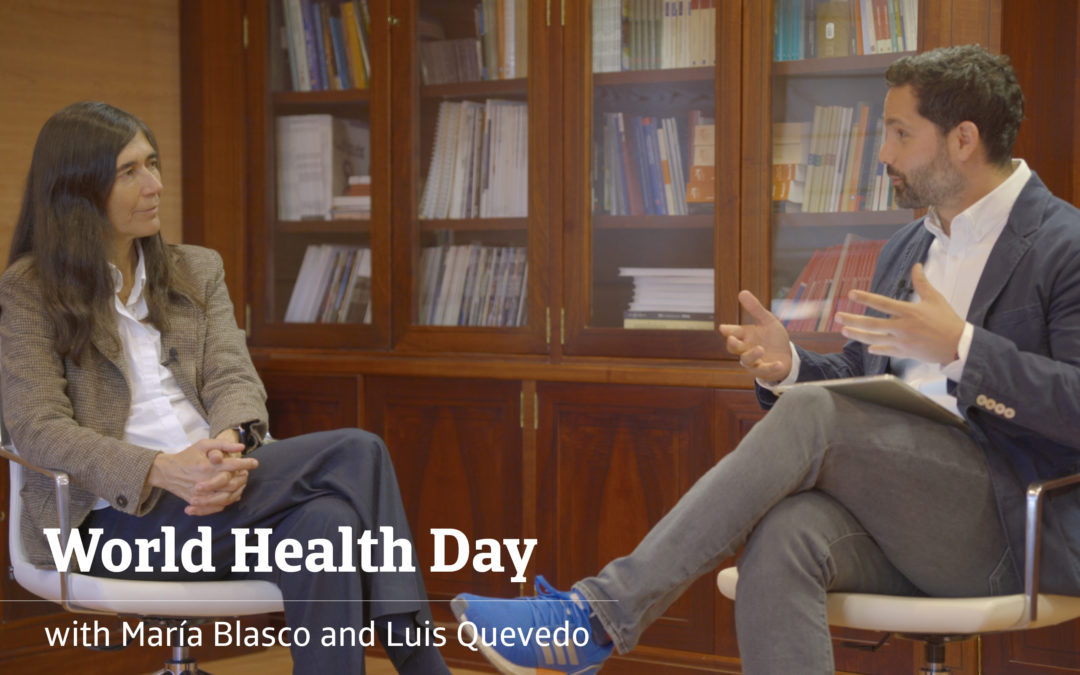On this World Health Day, we went to the Centro Nacional de Investigaciones Oncológicas (National Cancer Research Centre, CNIO) to meet with María Blasco, director of the centre and president of the jury for the Fundación Occident Awards.
This time, Luis Quevedo, director of strategic projects at the Fundación Española para la Ciencia y Tecnología (Spanish Foundation for Science and Technology FECYT), joined us to interview María. They talked about health prevention and the importance of advocating for research that helps understand how diet and lifestyle habits affect molecular mechanisms and, subsequently, transfers this knowledge to clinical practice.
Luis Quevedo – We’re celebrating World Health Day. It’s now 75 years during which, together with the World Health Organization, we’ve been celebrating great success and progress in public health. On this occasion, they’ve gathered us —the CNIO, FECYT and Fundación Occident— to discuss how research is or can be key to progress, for example, in prevention. What role can research play in prevention?
María Blasco – We already know that diseases don’t appear the day we go to the doctor and we’re diagnosed with them, but rather they’ve been developing in our body for decades. We now know this is true in diseases such as Alzheimer’s, cancer, etc.
It’s very important that we become aware of what originates these diseases at a molecular level in order to be able to prevent or delay their occurrence. That’s what genuine effective prevention is for me: prevention based on the origin of diseases.
L.Q. – Diet and nutrition is also a field in which evidence-based work is relatively recent; mainly, due to the difficulty involved in clinical studies. You’re the president of the jury for the Fundación Occident Research Awards, which specifically focuses on new research in diet and nutrition. What can you tell us about this field and the suitability of these awards?
M.B. – The awards are very important and feature a basic research category as well as a clinical research category. The basic research category is aimed at identifying metabolic mechanisms, eating, etc. All our winners are men or women leading the field of molecular biology. We can only understand which lifestyle habits are healthy when we understand the mechanisms they affect, and figuring this out is essential.
L.Q. – We’re in a situation in which everyone is interested in retarding ageing and staying healthy longer, as it seems like we’re going to live longer. This is happening in a somewhat crazy, lawless market. What do you think is going on in terms of the conflict between big promises, sometimes with vague scientific language, and what you really know and can propose?
M.B.- Remember that the only way to eliminate an infectious disease is by killing the germ. This hasn’t been the case in most diseases that kill us and aren’t infectious, except for cancer, which I believe has been a pioneering field in which certain cancers are being treated according to their origin. Cancer is the first case of a disease associated with the ageing process, which are all of them except for infectious diseases, that’s being cured according to the knowledge we have about its origin.
Molecular knowledge won’t only help us cure diseases, but also prevent them and diagnose them in time, as well as learn which lifestyle habits are better or worse, because we’ll be able to correlate lifestyle habits with molecular causes. I think we’re at a very interesting time, as we may be at the gates of finally being able to cure a degenerative disease, which we haven’t been able to do so even once, and we’re in the 21st century.

